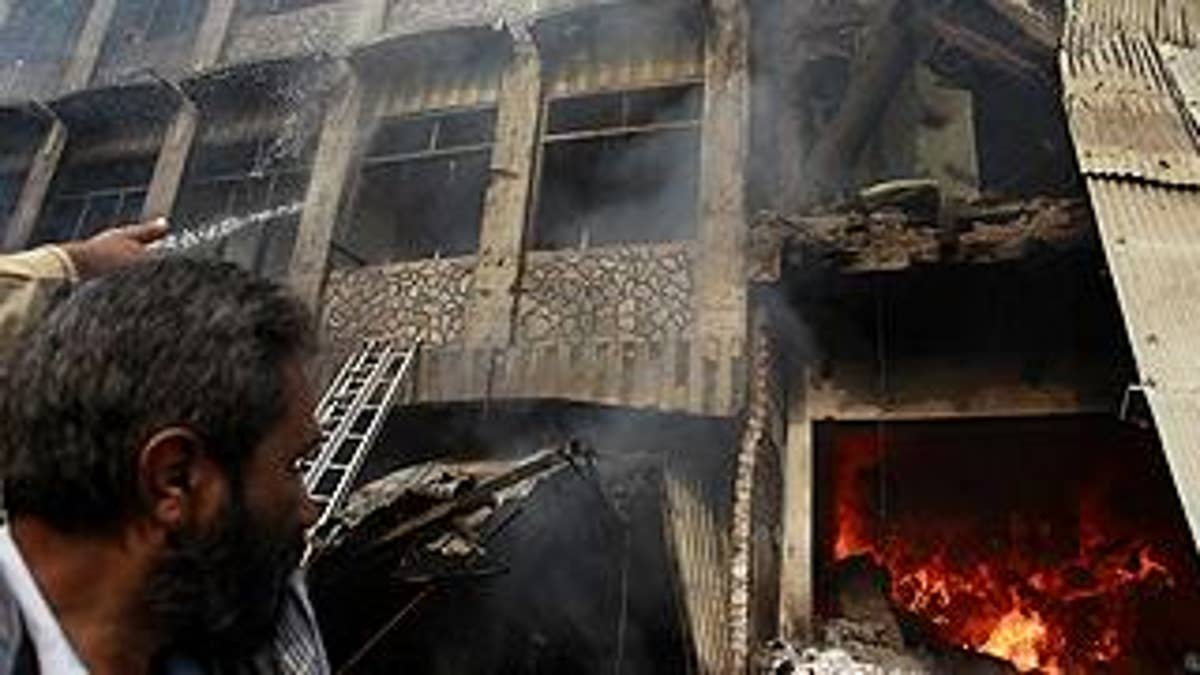
As President Obama ponders sending tens of thousands more American soldiers to war, he is confronting a military challenge that is much larger than Afghanistan alone.
A massive car bomb that killed at least 100 people and wounded more than 200 others in northwestern Pakistan on Wednesday shows that drastic action will be needed to combat terrorism throughout the region -- not just in Afghanistan, where U.S. troops are winding up their deadliest month since the war began eight years ago.
Wednesday's marketplace bombing was the third in Peshawar this month by Taliban forces who seek to undercut support for the Pakistani army and expose the weakness of the Pakistani government. The combined death toll from the three blasts is 250 people.
Secretary of State Hillary Clinton was in Islamabad, Pakistan's capital, visiting the country for the first time as America's chief diplomat when the attack occurred, and she pledged the U.S. will support Pakistan in its ongoing campaign against militants.
Pakistan is currently struggling against "tenacious and brutal extremist groups," Clinton told reporters at the Ministry of Foreign Affairs. "I want you to know this fight is not Pakistan's alone. ... These extremists are committed to destroying what is dear to us as much as they are committed to destroying that which is dear to you and to all people. So this is our struggle as well."
White House Press Secretary Robert Gibbs told reporters in Washington that Obama extends his condolences to "innocent victims" of violent extremists in Afghanistan or Pakistan.
"The events in Pakistan demonstrate the lengths extremists will go to and the type of threat they pose not just for this country, but for the country of Pakistan as well," he said.
But as Obama continues to deliberate whether to send additional troops to Afghanistan -- Stanley McChrystal, his top general there, has asked for 40,000 more troops to join the 68,000 already committed -- Wednesday's deadly bombing in Pakistan shows drastic action is needed elsewhere in the region.
Wednesday's bombing was part of a "real campaign" by extremists to demonstrate that they're a "force that can strike at any time and any place," said Gabe Schoenfeld, a senior fellow at the Hudson Institute, a Washington-based think tank.
"The war has been in Pakistan for some time," Schoenfeld told Foxnews.com. "The Taliban and Al Qaeda are heading for any point that's weak. This is their pushback, an attempt to try and destabilize Pakistan before they're crushed.
"It's a very critical moment. If the Pakistani military can deprive them of a safe haven, they can make it much more difficult for them to operate."
But, he said, the Pakistani authorities so far "cannot stop them."
"The Pakistani government needs to snuff this out and will require pressing hard against the Taliban and their safe haven," he said.
Back in August 2007, during the presidential campaign, Obama was sharply criticized for saying in a debate against Clinton that he would send U.S. troops into Pakistan without that country's approval if it meant stopping terrorists.
"I find it amusing that those who helped to authorize and engineer the biggest foreign policy disaster in our generation are now criticizing me for making sure that we are on the right battlefield and not the wrong battlefield in the war against terrorism," he said at the time. "If we have actionable intelligence on Al Qaeda operatives, including [Usama] bin Laden, and [then] President Musharraf cannot act, then we should. That's just common sense."
Obama has stepped far back from that stance since then and embraced attempts at diplomatic ways to stem extremism in the region. The Pakistani leadership has also changed, as with Asif Ali Zardari replacing Pervez Musharraf as president.
Malou Innocent, a foreign policy analyst at the libertarian Cato Institute, said any consideration of sending U.S. troops into Pakistan would have "blowback written all over it." She likened the possibility to "kicking over a hornet's nest."
"It's no coincidence we see this absence of authority in the Pashtun regions of both Afghanistan and Pakistan," she said. "These are indigenous tribes who have always wanted authority and are zealously hostile towards foreign governments and invaders."
Schoenfeld disagreed, saying a "military solution" may be the only possible route against the Taliban in Pakistan.
"The Taliban in Pakistan have to be decisively defeated," he said.
On Wednesday, Obama signed the National Defense Authorization Act for fiscal year 2010, which began on Oct. 1. In it is a provision to pay off low-level Taliban who renounce the insurgency, similar to a plan that was used for insurgents in Iraq. The administration hopes that finding jobs and resources for Taliban will lure them from violence and increase stability in Afghanistan.
Innocent said she agreed with U.S. Central Command Chief Gen. David Petraeus' suggestion that negotiations with some members of the Taliban could lead to reductions in violence in areas of Afghanistan. But Wednesday's bombing is proof that "anarchy flourishes" in the absence of a legitimate state authority in Pakistan.
"The original Afghani Taliban can be dealt with politically," Innocent said. "But the Pakistani Taliban is a far more nefarious problem and one that can be dealt with only by the Pakistanis themselves."
Earlier this month, Obama signed a law granting a $7.5 billion aid package for Pakistan over five years. The Pakistani government, however, criticized the bill as tantamount to U.S. meddling in its internal affairs.











































